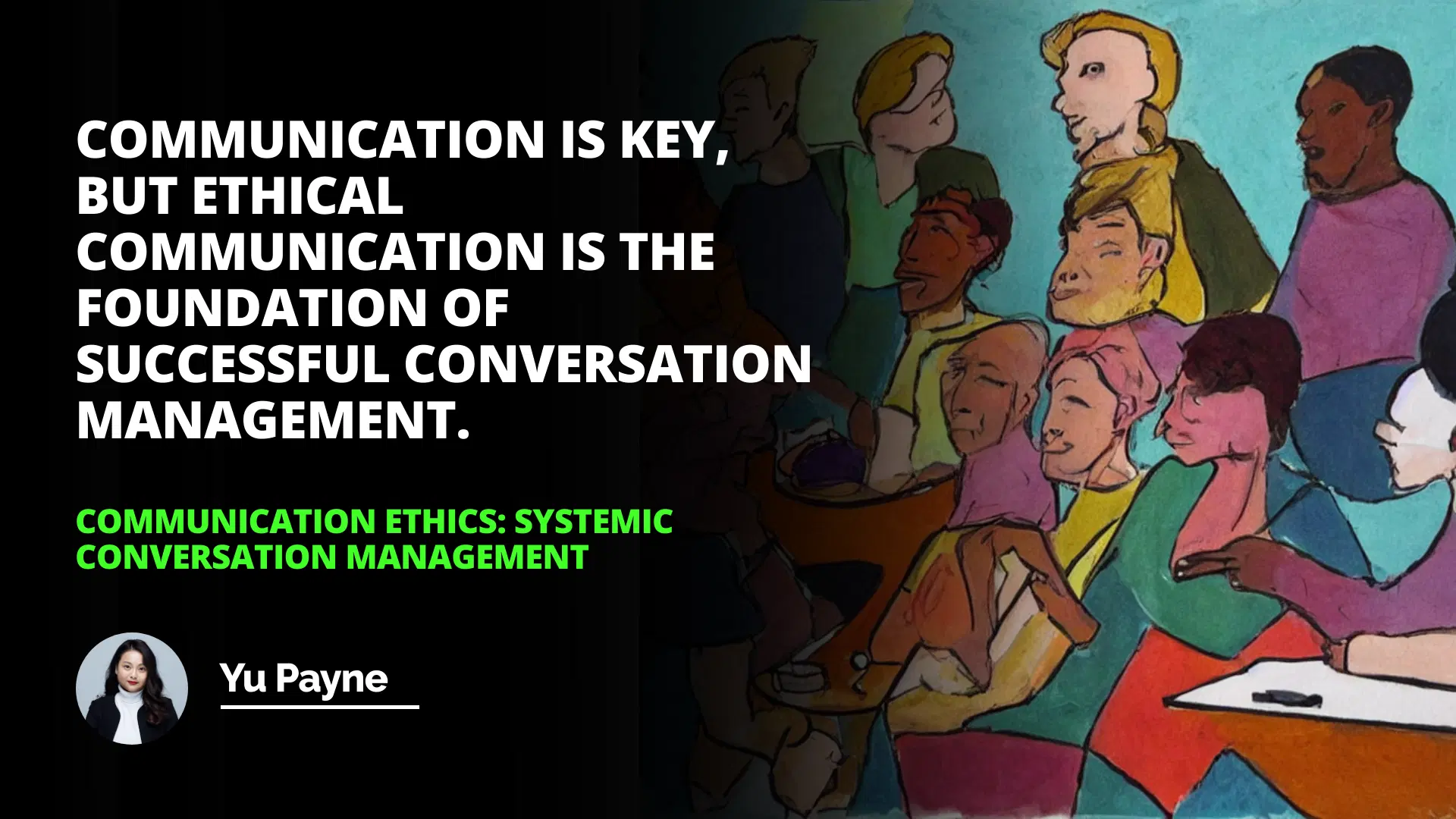
I. Introduction to Systemic Conversation Management
II. Ethical Considerations in Systemic Conversation Management
III. Impact of Systemic Conversation Management on Communication Conduct
IV. Benefits of Systemic Conversation Management
V. Strategies for Implementing Systemic Conversation Management
Introduction to Systemic Conversation Management
Communication ethics is an essential consideration for any organization or business. As such, strategies need to ensure that communication within the organization is conducted ethically. Systemic conversation management is one such strategy, which seeks to create an ethical framework for conversation that encourages open dialogue and respect for all participants.
Systemic conversation management is a process that seeks to create an environment in which communication can be conducted respectfully and ethically. It is a process that involves using guidelines and protocols to ensure that conversations are conducted safely and respectfully. These protocols are designed to promote open dialogue, foster mutual respect, and create a culture of honest communication.
Ethical Considerations in Systemic Conversation Management
Systemic conversation management is based on the premise that all conversations should be conducted in a manner that is respectful and ethical. This means that talks should be conducted in a way that respects the rights and autonomy of all participants. This also means that discussions should be conducted in a way that does not discriminate against any person or group.
When implementing systemic conversation management, it is essential to consider the ethical implications of the system. This includes ensuring the system does not discriminate or marginalize any person or group. Furthermore, ensuring that the system does not create an environment where conversations become dominated by one voice or viewpoint is essential. Finally, ensuring that the system does not encourage a culture of silence or censorship is also necessary.
Impact of Systemic Conversation Management on Communication Conduct
Systemic conversation management can have a positive impact on communication conduct. Creating an ethical framework for a conversation can help ensure that discussions are conducted respectfully and honestly. This can help foster an environment where all participants are heard and respected. Furthermore, it can create a culture of open dialogue and mutual respect, leading to more productive conversations.
Benefits of Systemic Conversation Management
There are many benefits to implementing systemic conversation management. Firstly, it can help to ensure that conversations are conducted respectfully and ethically. Secondly, it can help foster an environment where all participants are heard and respected. Finally, it can create a culture of open dialogue and mutual respect, leading to more productive conversations.
Strategies for Implementing Systemic Conversation Management
Several strategies can be used to implement systemic conversation management. Firstly, it is essential to create guidelines and protocols for conversations. These guidelines should promote open dialogue, foster mutual respect, and create a culture of honest communication.
Secondly, ensuring that all participants know the guidelines and protocols is essential. This can be done through training and education. Finally, it is necessary to ensure that the system is monitored and evaluated regularly to ensure it functions as intended.
Conclusion
Systemic conversation management is essential for promoting ethical communication within an organization or business. Creating guidelines and protocols for conversations can help ensure that discussions are conducted respectfully and honestly. Furthermore, it can help foster an environment where all participants are heard and respected. Finally, it can create a culture of open dialogue and mutual respect, leading to more productive conversations.
Communication is vital, but honest communication is the foundation of successful conversation management.
Frequently Asked Questions
What are the key principles of systemic conversation management?
Systemic conversation management is an essential skill in the business world, especially in customer service. It is a process of directing conversations to ensure that all necessary information is communicated and everyone involved feels heard. The fundamental principles of systemic conversation management are active listening, understanding the other person's point of view, and having an open mind.
Active listening involves giving undivided attention to the speaker and understanding what they are saying without interruption or judgment. This allows for better communication as it encourages the speaker to be more open about their feelings and ideas. Additionally, active listening can help identify underlying issues or concerns that may not have been immediately obvious during the conversation. It also helps build trust between parties by showing respect for the other person's opinion and promoting mutual understanding.
Understanding the other person's point of view is essential for successful communication. It encourages empathy toward others and promotes respectful dialogue by allowing individuals to comprehend where one another is coming from. In addition, by considering another individual's feelings, beliefs, or values, conversations can be more productive as both parties can relate better to one another's ideas or opinions.
Finally, having an open mind during conversations can lead to beneficial outcomes, allowing individuals to consider different perspectives without jumping to conclusions too quickly. By accepting new information without making assumptions based on preconceived notions, individuals can reach a more informed decision faster than if they were stuck in their mindset throughout the conversation.
In conclusion, systemic conversation management requires active listening skills, understanding another's point of view; and having an open mind throughout conversations for effective communication between two parties involved in any discussion. By following these fundamental principles, individuals will be able to reach mutual understandings that result in beneficial outcomes for all involved participants
How is systemic conversation management used to create an ethical framework for communication?
Systemic conversation management (SCM) is a method of creating an ethical framework for communication by setting standards, identifying risks, and establishing protocols for addressing them. SCM is based on the idea that conversations are part of a more extensive system, or network, of communication between people and organizations. This system comprises various elements, such as structures, processes, and policies. The purpose of SCM is to ensure that conversations are conducted ethically, respecting all participants' rights, interests, and needs.
The first step in establishing an ethical framework for communication is to develop a set of standards for conversations. This includes defining the conversation's goals, the participants' roles, and the expectations for behavior. These standards should be based on existing ethical principles and apply to all participants. Once standards are in place, SCM can be used to identify potential risks associated with conversations, such as the potential for misunderstandings, misunderstandings, or inappropriate behavior.
Once risks are identified, SCM can be used to develop protocols for addressing them. This includes developing methods for dealing with disagreements, resolving conflicts, and establishing procedures for addressing inappropriate behavior. These protocols should be designed to promote all participants' rights and interests while respecting their individual differences.
In addition to developing standards and protocols, SCM can create a culture of honest communication. This includes educating participants about open communication and providing resources for understanding and practicing it. It also involves establishing a system of accountability, in which all participants are held accountable for their actions, and providing feedback to help participants learn from their mistakes.
Ultimately, systemic conversation management can create an ethical framework for communication by setting standards, identifying risks, and developing protocols for addressing them. This framework should provide a safe and respectful environment for participants to have meaningful conversations while respecting the rights and interests of all involved.
How can systemic conversation management promote open dialogue and respect for all participants?
Open dialogue and respect between all participants are essential for a successful conversation. Systemic conversation management can be used to promote this in various ways. Systemic conversation management is an approach to managing conversations that focuses on the dynamics between different parties and encourages each participant to consider their perspective and that of others.
One way systemic conversation management can promote open dialogue and respect is by helping participants become aware of the underlying power dynamics in conversations. Power imbalances can lead to some voices being marginalized or ignored while specific perspectives dominate the discussion. Using systemic conversation management, participants are encouraged to examine how their views may influence the debate and how they can constructively use their power. This creates an environment where everyone’s voice is respected and heard.
Systemic conversation management also encourages respectful communication between participants by emphasizing non-violent communication techniques such as active listening and empathy. These techniques help participants better understand each other’s perspectives and communicate more effectively without resorting to aggression or hostility. Furthermore, it helps create a safe space for meaningful dialogue by setting ground rules for interactions that discourage disrespectful behavior, such as personal attacks or one-upmanship.
Finally, systemic conversation management helps promote open dialogue by encouraging participants to challenge their assumptions about the topic. This allows them to explore new ideas and perspectives, which can lead to a deeper understanding among all parties involved in the discussion. It also creates an environment where people feel free to express themselves without fear of judgment or criticism from others, thereby creating openness and respect among all participants in the conversation.
In conclusion, systemic conversation management provides powerful tools for promoting open dialogue and respect among all participants in a discussion. By creating an environment where everyone’s voice is respected, encouraging respectful communication techniques, and challenging assumptions about topics at hand, systemic conversation management enables meaningful conversations that foster understanding amongst all involved parties while respecting each individual’s perspective.


